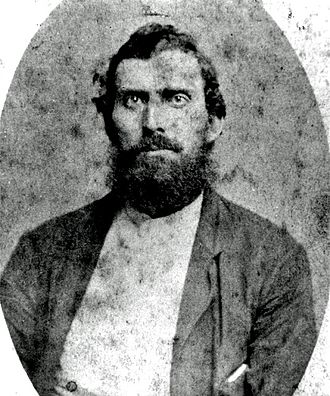 |
| Newton Knight |
Newton Knight (November 1837 – February 16, 1922) was an American farmer, soldier and southern Unionist, best known as the leader of the Knight Company, a band of Confederate army deserters that turned against the Confederacy during the Civil War. Local legends state that Knight and his men attempted to form the "Free State of Jones" in the area around Jones County, Mississippi, at the height of the war, though the exact nature of the Knight Company's opposition to the Confederate government is disputed. After the war, Knight aided Mississippi's Reconstruction government.
Knight has long been a controversial figure. Historians and descendants disagree over his motives and actions, with some arguing he was a noble and pious individual who refused to fight for a cause in which he did not believe, while others have portrayed him as a manipulative outlaw. This controversy was fueled in part by Knight's postwar marriage to a freed slave, which effectively established a small mixed-race community in southeastern Mississippi. The marriage would have been considered illegal as Mississippi banned interracial marriages except from 1870 to 1880 during the Reconstruction era.
The 1942 James H. Street novel, Tap Roots, was inspired by Knight's actions in the Civil War. The novel was the basis for the 1948 film of that name, which was directed by George Marshall.
Newton was a grandson of John "Jackie" Knight (1773–1861), one of Jones County's largest slaveholders. Newton's father, Albert (1799–1862), however, did not own any slaves, and was the only child of Jackie Knight who did not inherit any slaves. Newton, likewise, did not own any slaves. Some say he was morally opposed to the institution due to his Primitive Baptist beliefs. As a staunch Primitive Baptist, Newton also forswore alcohol, unlike his father and grandfather. He was probably taught to read and write by his mother.
Knight, like many Jones Countians, was opposed to secession. The county elected John H. Powell, the "cooperation" (anti-secession) candidate, to represent them at Mississippi's secession convention in January 1861. Powell voted against secession on the first ballot, but under pressure, switched his vote on the second ballot, joining the majority in voting to secede from the Union. In an interview many years later, Knight suggested many Jones Countians, unaware of how few options he had, felt betrayed by Powell.
Knight enlisted in the Confederate Army in July, 1861. He was given a furlough in January 1862, however, to return home and tend to his ailing father. In May 1862, Knight, along with a number of friends and neighbors, enlisted in Company F of the 7th Battalion, as they preferred to serve together in the same company, rather than with strangers.
Throughout the summer and fall of 1862, a number of factors prompted desertions by Jones Countians serving in the Confederate Army. One factor was the lack of food and supplies in the aftermath of theSiege of Corinth. Another involved reports of poor conditions back home, as small farms deteriorated from neglect. Knight was enraged when he received word that Confederate authorities had seized his family's horse. However, many believe Knight's principal reason for desertion was his outrage over the Confederate government's passing of the Twenty Negro Law. This act allowed wealthy plantation owners to avoid military service if they owned twenty slaves or more. An additional family member was exempted from service for each additional twenty slaves owned. Knight had also received word that his brother-in-law, Morgan, who had become the head of the family in Knight's absence, was abusing Knight's children. Morgan's identity has since been lost, but he is thought to be Morgan Lines, a day laborer and convicted murderer.
Knight was reported AWOL in October 1862. He later defended his desertion, arguing, "if they had a right to conscript me when I didn't want to fight the Union, I had a right to quit when I got ready." After returning home having deserted in the retreat following the defeat at Corinth, Knight, according to relatives, shot and killed Morgan.
In early 1863, Knight was arrested and jailed, and possibly tortured, by Confederate authorities for desertion. His homestead and farm were destroyed, leaving his family destitute.
As the ranks of deserters swelled in the aftermath of the Siege of Vicksburg, Confederate authorities began receiving reports that deserters in the Jones County area were looting and burning houses. A local quartermaster, Captain W. J. Bryant, reported that "the deserters have overrun and taken possession of the country, in many cases exiling the good and loyal citizens or shooting them in cold blood on their own door-sills." General Braxton Bragg dispatched Major Amos McLemore to Jones County to investigate and round up deserters and stragglers. On October 5, 1863, McLemore was shot and killed in the Ellisville home of Amos Deason, and Knight was believed to have pulled the trigger.[3]
 |
| Leaf River |
On October 13, 1863, the Knight Company, as it was called, a band of guerillas from Jones County and the adjacent counties of Jasper, Covington, Perry and Smith, was organized to protect the area from Confederate authorities. Knight was elected "captain" of the company, which included many of his relatives and neighbors. The company's main hideout, known as "Devils Den," was located along the Leaf River at the Jones-Covington county line. Local women and slaves provided food and other aid to the men. Women blew cattlehorns to signal the approach of Confederate authorities.
From late 1863 to early 1865, the Knight Company allegedly fought fourteen skirmishes with Confederate forces. One skirmish took place on December 23, 1863, at the home of Sally Parker, a Knight Company supporter, leaving one Confederate soldier dead and two badly wounded.
During this same period, Knight led a raid into Paulding, where he and his men captured five wagonloads of corn, which they distributed among the local population. The company harassed Confederate officials, with numerous tax collectors, conscript officers, and other officials being reported killed in early 1864. In March 1864, the Jones County court clerk notified the governor that guerillas had made tax collections in the county all but impossible. In 2016, a letter dated February 13, 1864 from a Union scout addressed to Maj. Gen. John M. Palmer of the Union Army was discovered by a historian working in the National Archives. It estimates the Knight Company's numbers to be as high as 600 and confirms their intention to join up with the Union Army. The exact number is still a matter of debate, in light of an interview Knight gave after the war stating, "There was about 125 of us, never any more."
| General Polk |
By the spring of 1864, the Confederate government in the county had been effectively overthrown. Lieutenant General Leonidas Polk wrote Jefferson Davis on March 21, 1864, describing the conditions in Jones County. Polk stated that the band of deserters were “in open rebellion, defiant at the outset, proclaiming themselves ‘Southern Yankees,’ and resolved to resist by force of arms all efforts to capture them.” On March 29, 1864, Confederate Captain Wirt Thomson wrote James Seddon, Confederate Secretary of War, claiming the Knight Company had captured Ellisville and raised the U.S. flag over the courthouse in Jones County. He further reported, “The country is entirely at their mercy.” General William Tecumseh Sherman received a letter from a local group declaring its independence from the Confederacy. In July 1864, the Natchez Courier reported that Jones County had seceded from the Confederacy.
General Polk initially responded to the actions of the Knight Company by sending a contingent under Colonel Henry Maury into the area in February 1864. Maury reported he had cleared the area, but noted the deserters had threatened to obtain "Yankee aid" and return. Shortly afterward, Polk dispatched a veteran contingent of soldiers led by Colonel Robert Lowry, a future governor who would later describe Knight as an "ignorant and uneducated man." Using bloodhounds to track down guerillas in the swamps, Lowry rounded up and executed ten members of the Knight Company, including Newton's cousins, Benjamin Franklin Knight and Sil Coleman. Newton Knight, however, evaded capture. He later stated his company had unsuccessfully attempted to break through Confederate lines to join the Union Army.
At the end of the war, the Union Army tasked Knight with distributing food to struggling families in the Jones County area. He also led a raid that liberated several children who were still being held in slavery in a nearby county. Like many Southern Unionists, he supported the Republican Party, namely the Reconstruction administration of Governor Adelbert Ames. As conflict mounted between white neo-Confederate resistance (the Ku Klux Klan) and the Republican Reconstruction government, Ames appointed Knight Colonel of the First Infantry Regiment of Jasper County, an otherwise all black regiment defending against Klan activity. After southern Democrats regained control of the state government, he withdrew from politics.
In 1870, Knight petitioned the federal government for compensation for several members of the Knight Company, including the ten who had been executed by Lowry in 1864. He provided sworn statements from several individuals attesting to his loyalty to the Union, including a local judge and a state senate candidate. But the federal Court of Claims ruled that "the evidence fails to support the allegation of the petition that the Jones County Scouts were organized for military service in behalf of United States or that they were in sentiment and feeling throughout the war loyal to the Government of the United States."
| Rachel Knight |
By the mid-1870s, Knight had separated from his wife, Serena, and married Rachel, a woman formerly enslaved by his grandfather. During the same period, Knight's son, Mat, married Rachel's daughter, Fannie, and Knight's daughter, Molly, married Rachel's son, Jeff. Newton and Rachel Knight had several children before her death in 1889. Newton Knight died on February 16, 1922 at the age of 84. In spite of a Mississippi law that barred the interment of whites and blacks in the same cemetery, he was buried next to Rachel on a hill overlooking their farm. Newton's engraved epitaph stated "He lived for others."
| Newton and his grandson abt. 1910's |

























